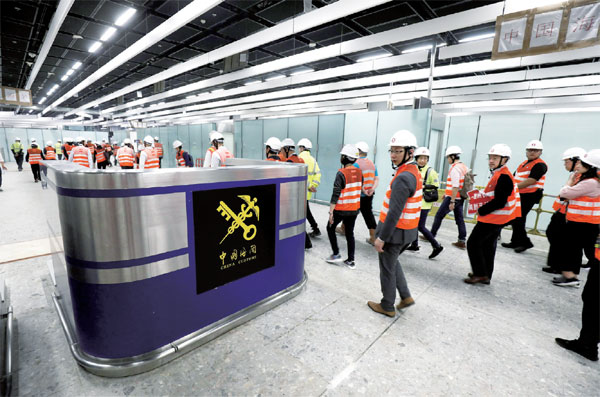Lai backs co-location as 'only way'
2018-05-31 11:19:45
Former security chief demolishes arguments against arrangement for joint boundary control at West Kowloon
Co-location of boundary control facilities by Hong Kong and mainland authorities inside the West Kowloon Station is the "right and only" way to connect the city to the nation's high-speed rail network, says Lai Tung-kwok.
The former Hong Kong Special Administrative Region secretary for security said that without co-location, the Guangzhou-Shenzhen-Hong Kong Express Rail Link will not maximize its full potential because of prolonged clearance procedures.
"The co-location arrangement is the right way and the only way," he stressed.
"For Hong Kong to connect to the 25,000-kilometer national high-speed rail network throughout the country that may in future link up with foreign countries, we cannot do without co-location," Lai told China Daily.
Local legislation will provide a legal basis for a Mainland Port Area in West Kowloon Station and allow the XRL to begin operating in the third quarter.
A Legislative Council bills committee has finished vetting the relevant bill. Debate at the second reading stage will resume on June 6; it is expected to be passed into law after several meetings despite opposition filibusters.
Opposition parties regularly obstruct co-location plans -arguing the arrangement is not stipulated in the Basic Law. They have even misled the public with an absurd claim that West Kowloon Station is being "ceded" to the mainland, Lai noted.
But the former security chief rejected such arguments: "How can they say 'ceded land' knowing Hong Kong is part of China?"
Lai also rejects fears and lies exploited by the opposition camp, telling them not to travel on the XRL if they are worried.
"Mainland officers will only perform duties in the designated Mainland Port Area of West Kowloon Station. Mainland Port Areas exist in all cross-boundary check points. This time, the only difference is the port area is located at West Kowloon Station.
"The model exists at Shenzhen Bay and it has proved a very successful example, handling a significant throughput of passengers and cargo daily," Lai noted.
"Look at the reaction from most Hong Kong citizens. They are so calm, sensible and not scared. If (the pan-democrats) are afraid, they should not board the XRL," he reiterated.
Moreover, co-location is nothing new overseas, Lai added, citing similar arrangements between the United States and Canada, and the United Kingdom and France.
A living instrument
Lai also raised the matter or whether things which were not written in the Basic Law should go ahead.
Being a constitutional document, the Basic Law is not as detailed as an ordinary piece of legislation, he explained. It is a living instrument which always keeps up with the times.
"In the law-drafting years, high-speed railways did not exist in China," Lai argued.
"The Basic Law did not mention (the erstwhile) Provisional Legislative Council. Since there was no political through train after 1997, the Provisional Legislative Council was justified during the transition period," he said.
Lai also questioned the issue raised by "pan-democrats" on public nomination of chief executive election candidates - there is no such provision in the Basic Law.
Lai did not elaborate on why co-location discussions between the mainland and Hong Kong had been deadlocked during the past five years.
"It was rather complicated," he said. "Yet this shows the consensus doesn't come easy after lengthy, thorough discussions.
"I look forward to traveling to different parts of China from West Kowloon Station on board the express trains, which are fast, reliable, punctual and comfortable," he said.
